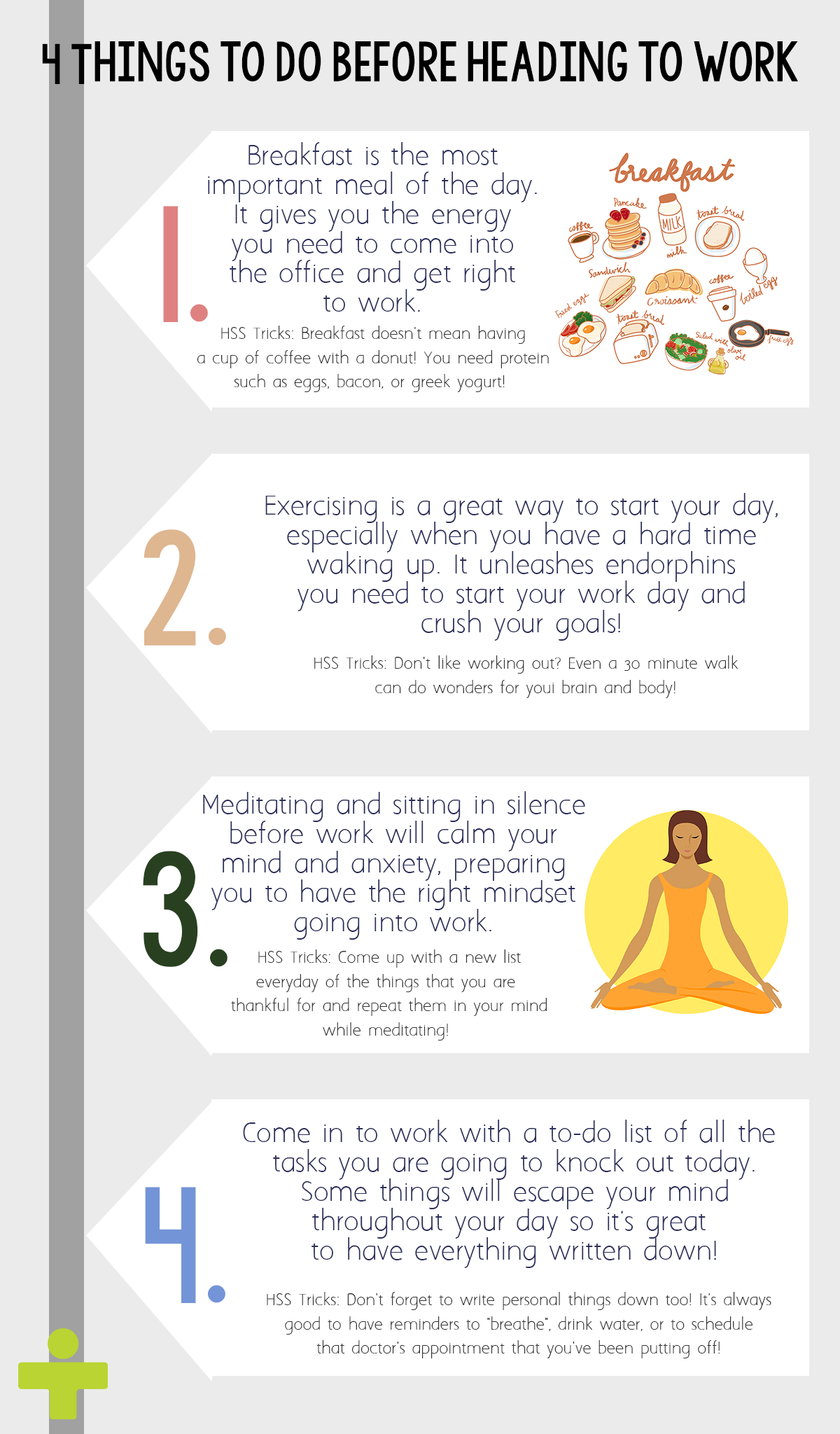There’s so many things to do to get yourself in the right mindset before you head off to work!

There’s so many things to do to get yourself in the right mindset before you head off to work!

As a Triage Nurse your challenging duty is to medically assess the patients’ illnesses and symptoms to determine which patients need immediate attention from the doctor. It’s a tricky job considering having to deal with a room full of worried patients and family members, so doing it as a novice can seem pretty much impossible. But, don’t worry, there have been many people in your shoes and we’re going to simplify it by giving you some tips and tricks to ace your job!
They are already scared, so try and ease their anxiety by treating them warmly. If you make your patients feel more comfortable, they will feel better telling you their medical history. If you were to be cold and emotionless, they might feel the need to withhold some important parts of their medical history that could help you in the end.
I know there may be tons of people in the waiting room but rushing your patients won’t do you any good. Take it slow with them. Make sure you’re getting all the information needed to be able to follow the correct protocol. It’s easy to jump to conclusions after you hear the first symptom but you need to explore all possibilities.
So many people come into the emergency room with self-diagnoses that they got from the internet. Take into consideration their concerns, but also give a full assessment and make your decisions based on that assessment. Remember that this is your decision and not theirs, you’re the one with the credentials and knowledge.
Probe a little further into your patient’s history or ask them questions that could narrow down the list of potential medical problems to improve your chances of finding the cause of your patients’ symptoms.
Be sure to make them comfortable enough to want to come in if they have any other symptoms or if any of their illnesses worsen. Don’t fall into the trap of once you hand off the patient to the doctor, you are done. Before the patient leaves, make sure he or she knows that if they have any questions or concerns to come to you. Be approachable. Also, make sure you’re communicating with your other patients in the waiting room by keeping them updated on delays or just simply checking in on them.
Triage nurses have a big responsibility as they are the first person a patient sees when they are scared and in a time of need. Figuring out the cause of their illness takes time and careful attention. To apply for one of our Triage Nurse positions, click here.
In just about every interview, you can expect to be asked, “Where do you see yourself in 5 or 10 years?” A generation ago, we used to know… You get a job in your twenties, work hard to get raise after raise, get promoted once or twice, and then you retire. Nowadays, people don’t know. They get bored with one company and then jump to the next one, looking for something that’s new and challenging, sometimes even returning to school for a complete career change. An unclear path like this makes it hard to create a career vision and figure out where you actually see yourself in 10 years. Hiring managers understand this jump-ship mentality and it’s why almost every hiring manager asks you this question.
Let’s dive in and help you take control of your own future.
In order for you to grow in your career, you also need to grow your skillset. Try to learn something new every day. Find people who have similar roles to you and take a look at their skills. What are they doing that you can’t?
Take the time to build relationships with people in the business world. This could open many doors for you down the road. It’s also nice to have a lot of people in your corner rooting for you to succeed. The more connections you have, the more possibilities there are. Use them to your advantage.
For example, if there’s an opening in upper management and you want the position, what do you do? Go to your supervisor and tell them why you should be considered for the role. Don’t tell them why you should have the role. Explain why you should be considered, use statistics, explain your experience, and share your accolades. Don’t risk being looked over for the position because you didn’t say something.
Write a list of all the things you love about your position to keep you motivated. Then, write a list of things you’d like to be doing down the road – skill wise. Chances are you could find that in with your current company. Maybe you’d like to lead a team- create a target and work towards it.
Consider your comfort zone a small circle around you using the skills and connections you’ve had for years. Now think of all the skills and connections outside of that small circle that you are missing out on. Live life to the fullest and try to be a “yes man”. You never know what could come out of going outside your comfort zone.
Figure out where you want to be, what direction you want to go in, and what you want to be doing (what’s your 10-year plan). Only you can control your future.
Temporary employment has seen tremendous increase over the past few years, especially in healthcare. Many industries, including retail and healthcare, experience increased personnel needs several times a year, be it for a special assignment, auditing or due to a seasonal increase in business.
Although it’s common to first see the cons in a temporary position, there are some very strong positives to keep in consideration. Temporary employment allows you to get a feel for or “test drive” a company and/or position. This type of employment can also offer the opportunity to pick up new skills that were not available to you in your past position. Another perk to a temporary job comes in the connections you will make. Getting the opportunity to work a temporary job alongside a professional you admire or for a highly sought-after firm will allow you to expand your contacts and build professional and personal connections that could provide solid references or suggest you for a future permanent opening.
Now that you know the vantage point of temporary employment, let’s look into ways you can use a temporary assignment to land a permanent position:

Be a successful temporary employee and show them why they need to hire you permanently. Treat your temporary position as a permanent one because managers look for quality workers that are committed, hardworking, and passionate about what they do.
Carpe diem! Seize every opportunity you get to better yourself – whether that be staying extra after work helping someone with their patient or arriving a few minutes early to help the administrators. Make it your mission to come in everyday and learn something new, whether that be in your job description or outside it. There is never such thing as too much growth and knowledge.

Teamwork skills are very important skills to build and maintain. Not only does it improve your relationship with your coworkers, but it also shows everyone that you have what it takes to work alongside them permanently. Your coworkers just might become your promoters when a permanent position becomes available.

This is probably the easiest thing to do, but is often overlooked. It’s important your manager and recruiter know you are serious about this position and want to be hired full time. Show them you are dedicated and motivated to fully be a part of the company. It doesn’t hurt to show them how you’ve impacted the company during your assignment either!
At HealthCare Support, we strive to be one of the most trusted employment partners in our industry. But, we aren’t only concerned with the quality of services we provide to our clients – we also take pride in providing a great place for our employees to work and a culture that they want to be a part of. Indeed, one of our core missions is “Shaping futures for individuals and their families.”
Our employees have come to learn this firsthand, as well as all the health care professionals we place in jobs. However, we also think the same way about our community here in Orlando. We are in a great position to be a positive force in our local community, and our service-based culture extends into many volunteering efforts.
Throughout the year, our Internal Development Team rallies our employees around several charitable causes. One of our favorite things to do is participating in various races and walks to raise money. Just last month, we were able to raise $12,000 for the American Foundation for Suicide prevention at the “Out of Darkness Walk.” We also had the privilege of sending several volunteers to the Florida Citrus Sports 2018 “Feast on the 50” at the Camping World Stadium. There, our employees helped raise money for disadvantaged children in the community surrounding the stadium.
Another thing we love to do is collecting food and supplies for different drives. We participate annually in the A Gift for Teaching School Drive, rounding up boxes of necessary school supplies like crayons, notebooks, pencils, markers, and scissors for needy students. And, as Florida residents who understand the devastating effects of hurricanes, we raise hurricane relief supplies for those most in need whenever the situation calls. Most recently, our team collected essentials like diapers, toilet paper, paper towels, food, and clothing for those affected by hurricane Michael last year.
Every deal we make, every professional we recruit, and every new person we hire allows us to have more of an impact around us. If you are looking for your next job in the healthcare industry, let us help! To get in touch with us, you can call 407-478-0332.
The Marie Kondo Effect – Spring Cleaning Edition
Spring is here! Have you started your spring cleaning? If not, watch “Tidying Up with Marie Kondo” on Netflix to get in the spirit. In the meantime, we’ve summarized some tips and tricks for getting organized and clean this spring.
I know two things in life. 1. Cleaning is one of the least exciting things ever. 2. Getting rid of things you might actually need down the road is a tough thing to do — what if you end up needing that $3 butterfly net you got at Goodwill 2 years ago? Chances are you probably won’t ever use it ever again but there’s always that “what if”.
“Tidying Up with Marie Kondo” helps us with that. The show is basically about a woman that goes around to people’s houses and helps them purge by dumping all their things on their beds and seeing which items still “spark joy”. If they don’t, to Goodwill they go. This not only works for your living space, but also for your car, your computer files, and of course, your work office!
So, why is spring cleaning beneficial?
Being busy in the 8-5 business world, I’m sure organizing your desk is one of the last things on your mind, but it can be really important for your success. Here are a couple reasons why you should spring clean your desk/office right this second:
When you have a place or file for everything you wont waste your time looking through piles of papers on your desk. Everything is right where it should be, and this keeps you at the top of your game.
If there are a lot of things on your desk, it’s easy to get distracted by old papers or old projects. There is also the factor that looking at your messy desk, and thinking about how you have a messy desk, is also distracting and wasting time. Having an unorganized desk makes for an unorganized mind.
. Someone who is a very professional person takes pride in appearing clean and organized, whether that be their outfit, makeup, hair, or even their desk. Look at your desk from a different perspective. What does the way it looks say about you?
. Being unorganized could leave you at risk for accidentally exposing delicate information that can easily be misplaced on a messy desktop. Keep all your sensitive information stored in a locked drawer.
. It’s hard to do your work when every time you reach for a sip of water, you knock something off your desk. Having a clean workspace, gives you the space you need to be diligent.
Besides productivity reasons, having a tidy desk also allows you to clean your desktop. Did you know the average desk contains 400 more germs than a toilet seat? Get in the groove of cleaning it every Friday, and you’ll surely cut back the amount of office colds you’re exposed to.
What better time than spring to do a little cleaning? Set some time aside to go through your drawers, your computer files, and your desktop to see which items “spark joy” in you. If they don’t, it’s time to say goodbye.
For those in the healthcare industry, interacting with patients is likely a key part of what you do every day. Though some like nurses and general practitioners see more of the patient than surgeons or anesthesiologists, anyone involved with healthcare needs to have the interpersonal skills to relate to their patients. After all, the whole purpose of healthcare is to administer to the sick and injured, and the relational aspect is no small piece of that. Here are some things to do, and not to do, every time you meet with a patient.
HealthCare Support can help talented, passionate healthcare professionals find the perfect long-term or short-term job. Our professional network is vast, and our dedicated team can help place you in the ideal situation for your career. To learn more about our open jobs and services, please give us a call at 407-478-0332.
Finding the right employee to fill an open position at your company can be tough. If it seems like over and over again you are hiring the wrong people, you may need some help with the hiring process. Specifically, you need to be able to pick up on positive and negative signs of a candidate during the interview process. This way, you’ll avoid the dreaded situation of figuring out you’ve hired the wrong person and having to start the search over again. Watch out for the following indicators of good and bad candidates for your next job opening.
Paying attention to the candidate’s level of interest in the job is critical. Sure, some may be polished, seasoned interviewees who know how to fake it for a job offer. But, you will usually be able to tell in your gut after getting to know them better if they are truly excited to work with you. On the other side, it is a serious red flag if the interviewee seems like they’d rather be somewhere else.
Punctuality conveys that the candidate values your time and is thoughtful enough to plan ahead. A good candidate will have multiple hard copies of their resume, and their resume itself will be carefully constructed with perfect grammar and punctuation. If a candidate comes in without their resume, or it has typos and basic mistakes, it shows that they are not detail-orientated and lack focus. If you think you can overlook these things, remember that they will likely make similar mistakes after you hire them.
If the candidate is asking in-depth questions about your company, it shows that they have spent time thoroughly researching things before coming in. Even more so, it demonstrates that they have carefully considered what it would be like to work at your company and aren’t sending out applications all over the place. A candidate that has no questions for you at the end of the interview is likely one that isn’t actually interested in your company, but sees the job simply as a way to make money.
The hiring process can be tiresome, stressful, and costly, so let HeathCare Support help you fill open positions with the right candidates. Our team specializes in matching all manner of health care professionals to employers looking to hire. Call us today to learn about how we can assist employers at 407-478-0332.
Sometimes it’s tough to get your work done when there are so many things going on around the office — whether that’s because of coworker chit chat, that smartphone screaming your name begging to be checked (even though you checked it five minutes ago), or because your mind seems to be somewhere else. It can be hard to keep your focus on your work throughout your day. But, don’t worry, we’ve got your back. Here are some ways to stay focused at work:
Yes. It is absolutely okay to take little breaks. Go out for a walk around the building or do some stretches for five minutes. Reward yourself for good chunks of work with a short, friendly chat with your cube mate or scrolling through your Facebook feed. But you also need to remind yourself that these distraction periods should last about five minutes, then it’s back to business. You control it!
If you’re one of those people who constantly checks their phone every five minutes (even though nothing is different), maybe it’s time to turn off your phone. We know, that’s easier said than done but, turning off your phone actually has some great benefits, such as, making sleeping and waking up easier, increasing efficiency, improving productivity, and boosting your memory.
Let me guess. You sit close to a Chatty Kathy and a good chunk of your day is listening to them go on and on. Boy, do we have a solution for you! They’re called headphones! Wow! Amazing! But, seriously, if you put those bad boys in, Chatty Kathy will get the hint. Also, listening to music or podcasts provides inspiration and increases productivity. Especially, if you’re listening to jazz or classical music. Classical music is known for boosting your mood and your concentration. “Hey Siri, play Bach!”
Water. What a marvelous thing. Water has so many benefits and it solves everyone’s problem (OK, not really, but almost). Drinking water helps clear skin, cure headaches, promote weight loss, increase brain energy and function, boosts performance in exercise, we could go on! So, make sure your cup of water is always within reach to avoid unnecessary breaks in the office kitchen or at the water fountain.
Just like water, make sure your snacks are within reach. The only thing that will cure that annoying, grumbling stomach that you’ve been thinking about for the past hour is food!
Nothing will keep you more focused than writing all your tasks down. To-do lists help you prioritize what needs to get done and limits you to doing one thing at a time. Some people are great at multi-tasking but overall, multitasking lowers your work equality and efficiency. Keep your day organized with lists and cross those bad boys off when you finish a task, then reward yourself with a walk around the building.
Succumbing to those daydreams, phone alerts, or office chit chat can negatively impact you at work, so don’t let it happen! Put in those headphones, turn off that phone, or go to a quiet spot in the office for a little while – you’ll eventually notice you’re a lot more focused!
It always seems like everyone gets sick right around and after the holidays, doesn’t it? This year, it’s even worse than normal since winter has been so mild throughout the country. Allergens have persisted since there hasn’t been a steady freeze in many regions. Couple this with the usual viruses and infections making their rounds, and it’s a recipe for a rough season of sickness. Here are some of the more common illnesses to watch out for this winter.
Normally, allergies are the worst when plants start to bloom again in the spring. But in places like Florida, people have been struggling with seasonal allergies through even December and January since it has been so warm. Symptoms include a runny or congested nose, sneezing, itchy and watery eyes, ear blockage, postnasal drip, and general sinus inflammation. Allergies are best treated with prescription steroid nasal spray, but over the counter medications can help as well.
The common cold gets its name because it is a year-round virus, but it is more easily spread in winter. That fact has nothing to do with the nature of the virus itself – it spreads faster because people spend more times indoors to avoid cold weather, so more germs collect inside. The symptoms of this virus are primarily upper respiratory issues, like allergies, but could carry with them, in addition, a sore throat or cough with a mild fever. There is no treatment for this illness, but over the counter medications can help you manage the symptoms.
In contrast to the common cold, influenza or the flu does spread more easily in cold conditions, which is why the winter is dubbed the “flu season.” Because of this, most healthcare professionals stress the importance of getting a flu shot to guard against catching the virus. More serious fevers, muscle aches, and fatigue accompany this virus, in addition to all the other symptoms of a common cold.
Perhaps the nastiest thing going around during the winter is the norovirus, commonly called the “stomach bug.” Contrary to popular opinion, diarrhea and vomiting symptoms aren’t due to the flu or influenza, but to the norovirus. It generally lasts 1-3 days, but an infected person is contagious for a few days after recovering.
HealthCare Support is a national recruiting firm which strives to link talented healthcare professionals with employers across the country. We don’t only serve clinical professionals – we help everyone in the medical industry find the right job. To learn more about our services for employers and individuals, give us a call at 407-478-0332.